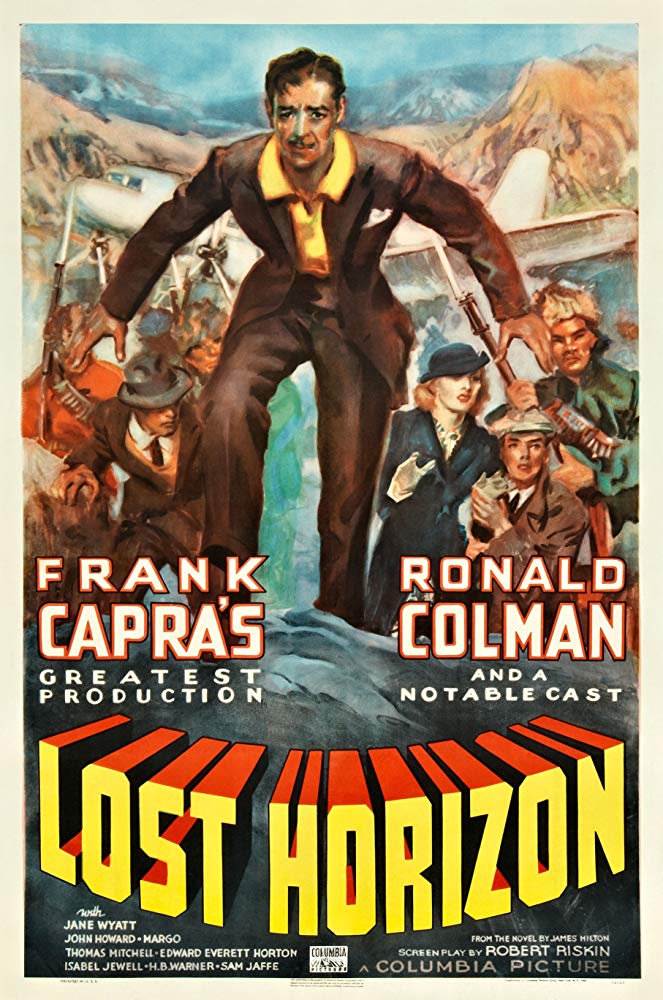
- Starring
- Ronald Colman, Jane Wyatt, Edward Everett Horton
- Writer
- Robert Riskin
- Director
- Frank Capra
- Rating
- n/a
- Running Time
- 132 minutes
Overall Score
Rating Summary
Lost Horizon follows Robert Conway (Colman), a British diplomat travelling to Shanghai with a diverse group of strangers that include a snobbish paleontologist named Lovett (Horton), a relaxed businessman named Barnard (Thomas Mitchell), a prostitute named Gloria (Isabel Jewell) and his impulsive brother George (John Howard) who all get into a plane that is purposely crashed into the snowy Himalaya. The group is soon found by Tibetan natives, who lead them to Shangri-la, a paradise hidden by the mountains.
While they gather their strength to take the journey back to society, Conway starts discovering the beauty of Shangri-la through his conversations with Chang (H.B. Warner) and his explorations of the place. He falls in love with Sondra (Wyatt), a woman who has admired Conway’s writings for years. She puts on a word for his with the High Lama (Sam Jaffe) and 200-year-old man who is the leader of the community and Conway finally realizes the magic beyond the idealistic nature of the place. But not everyone believes the ideals of the place: George believes they are made prisoners of the High Lama, and wants to flee the place as soon as possible, with the company of Maria (Margo) the woman he fell in love with. They convince Conway to escape with them, and when the do it, the true finally comes off.
Frank Capra had a hell of a decade in the 30’s: his movies were responsible for elevating Columbia Pictures from a small, not really respected studio into one of the greats for decades to come. Columbia became a force to be reckoned with because of Capra’s films: Lady For a Day, It Happened One Night, Mr. Deeds Goes to Town, Lost Horizon, You Can’t Take It With You, and Mr. Smith Goes to Washington. All of these films were huge box office successes and/or score really big at the Academy Awards, winning two best picture awards (It Happened One Night and You Can’t Take It With You) and three best director awards for Capra himself (the same two best pictures plus Mr. Deeds Goes to Town).
Because of his successes, Capra had carte blanche from the studio to do as he pleased with Lost Horizon , and he did just that. The process of writing the script took so long he ended up shooting Mr. Deeds in between. It was by far his biggest most expensive endeavor, and it shows on screen all the way through. The film is beautifully shot, and in certain moments we see how hard it must have been to shoot this one; all the Himalayan scenes were extremely complicated to make happen, the avalanche must have been a nightmare to create, but they all still work 80 years after the film was released.
Although it is an exciting film, Lost Horizon feels a little unbalanced. The first hour works wonderfully: that were the adventurous side of the story relies, where the plane crash is and the discovery of Shangri-la starts. But the second part of the film slows things down and the story drags a bit. That also happens because the film goes deeper and deeper into psychological territories, discussing complex subjects and even questioning us as an audience.
In the end, Lost Horizon is an exciting discussion on paper, but it doesn’t fully work when you see it in the film. It lacks a little more dramatic and cinematic traction and the movie suffers for it. ”
*still courtesy of Silver Screen Collection*
If you like this review, look me up on Instagram for more suggestions.
If you liked this, please read our other reviews here and don’t forget to follow us on Twitter or Instagram or like us on Facebook.
Discover more from
Subscribe to get the latest posts sent to your email.
